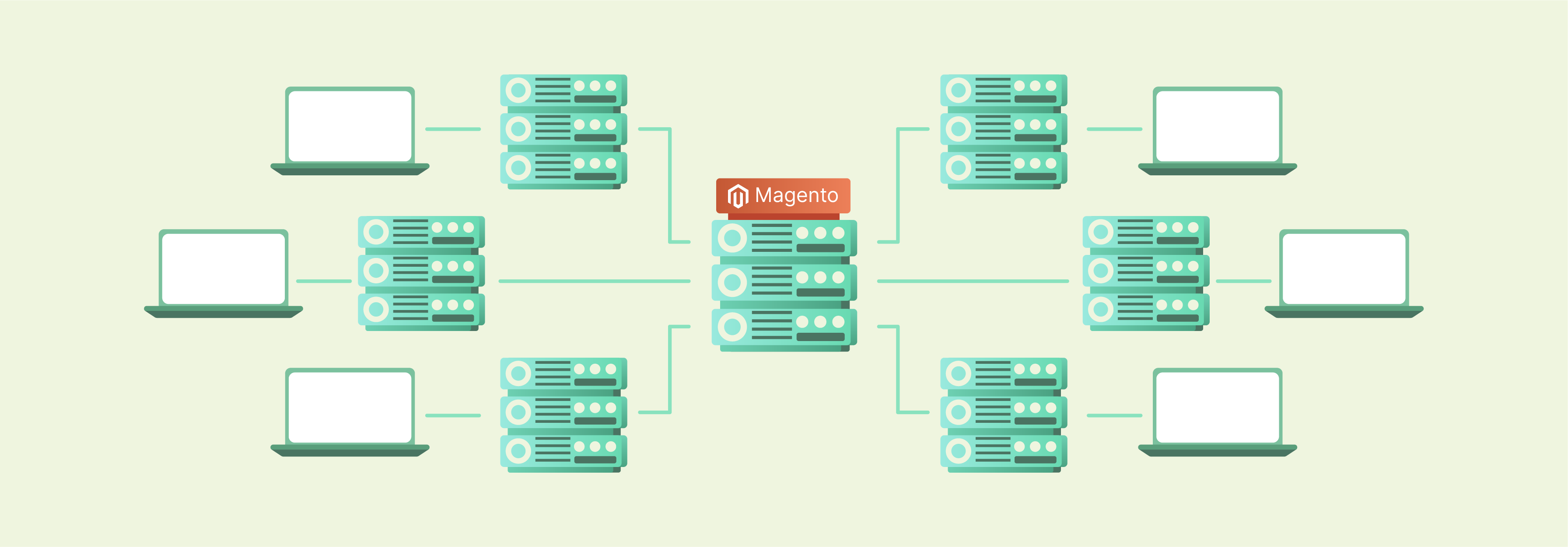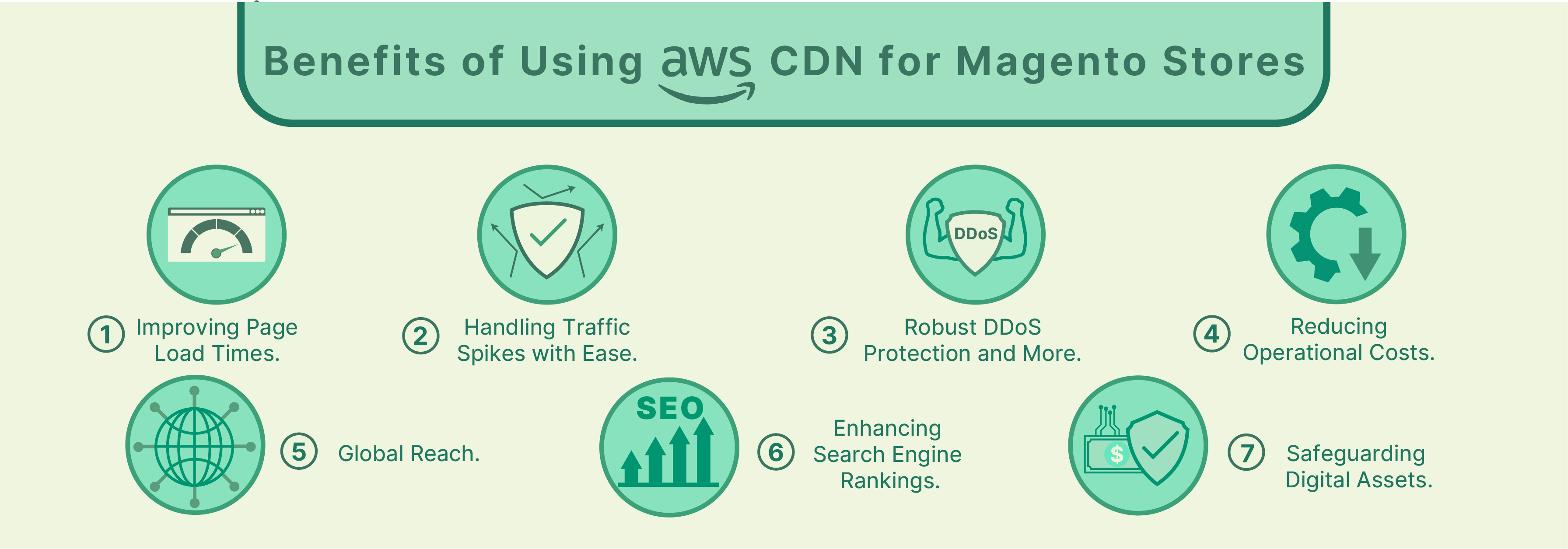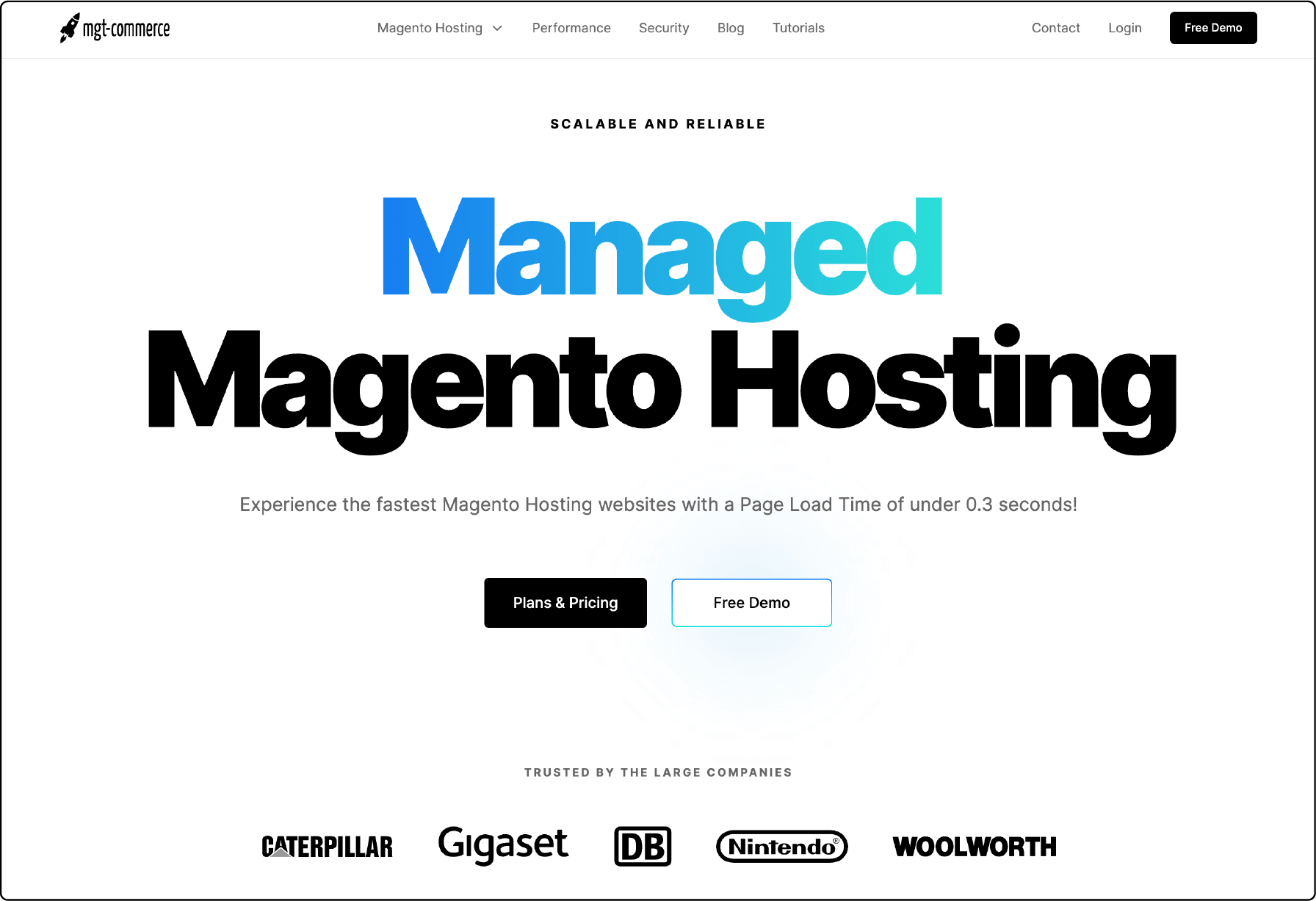
Best Hosting for Magento Ecommerce: Boosting Performance with AWS CDN
AWS CDN is a key feature in the best hosting for Magento ecommerce. It offer faster content delivery for your customers. This article will discuss how AWS CDN enhances performance for Magento ecommerce.
Key Takeaways
-
AWS CDN enhances Magento hosting performance through global content delivery.
-
CDN use reduces latency, improves speed, and optimizes user experience.
-
Security features of AWS CDN provide DDoS protection and HTTPS enforcement.
-
Integration of AWS CDN with Magento is straightforward, with clear guidelines.
-
Choosing the right hosting with AWS CDN integration is crucial for Magento stores.
What is a CDN?

A Content Delivery Network (CDN) is a network of servers. These servers are distributed across various geographical locations. The network is designed to deliver web content and pages to a user. The delivery is based on their geographic location, the origin of the webpage, and a content delivery server.
Amazon Web Services offers Amazon CloudFront, a content delivery network (CDN). The network comprises a global proxy server system that caches content near users. This includes web videos and other large media files for faster delivery. It enhances content access speed.
How Does a CDN Work?
When a user requests a webpage (e.g., an online store powered by Magento), the CDN redirects this request. It goes from the site's origin server to a server in the CDN closest to the user. This minimizes the distance the data has to travel. It reduces latency and speeds up content delivery.
CloudFront delivers content through a global network of AWS data centers known as edge locations. When a user requests content, CloudFront routes it to the edge location with the lowest latency. This ensures the content is delivered with optimal performance.
Why Magento eCommerce Needs a CDN?
Challenges Faced by Magento Stores
-
Magento stores, especially those with a global customer base, often struggle with delivering content quickly. They aim to reach all users efficiently, regardless of their location.
-
High-resolution images, extensive product catalogs, and dynamic content can slow page load times. This affects user experience and SEO rankings.
Mitigating Challenges with a CDN
-
Global Reach and Speed: A CDN places content closer to the end-user. This dramatically reduces load times and improves site performance. This is crucial for Magento stores aiming for a global presence. It ensures all users, no matter where they are, experience fast loading times.
-
Handling Traffic Spikes: CDNs can manage sudden surges in traffic. They prevent site crashes during peak shopping times by distributing the load across multiple servers.
-
Enhanced Security: Beyond performance benefits, CDNs also offer security advantages. These include DDoS protection and secure token authentication. They add an extra layer of security against web attacks.
Key Features of AWS CDN
1. Global Presence for Faster Access
AWS CDN's network of edge locations spans globally, placing content closer to users no matter where they are. This significantly improves access speeds by reducing the physical distance data must travel.
2. Reducing Load Times through Effective Caching
AWS CDN utilizes advanced caching strategies to store copies of static content (like images and CSS files) closer to the user. This reduces the need to fetch data from the origin server for every request, speeding up load times for Magento sites.
3. Securing Magento Sites with Enhanced Encryption
AWS CDN allows for the integration of custom SSL certificates and enforces HTTPS connections. This ensures data transmitted between the CDN and the end-user is encrypted, enhancing security and building trust with customers.
4. Safeguarding Against Traffic Attacks
AWS CDN includes built-in DDoS protection, helping to mitigate the risk of traffic-based attacks. This feature is crucial for maintaining the availability and reliability of Magento eCommerce sites during peak traffic periods or targeted attacks.
5. Automatically Optimizing for Performance
The service offers automatic content optimization features like compression and format adjustments. These features ensure that content is delivered in the most efficient format, improving site speed and user experience.
6. Personalizing Content Delivery Based on User Location
AWS CDN supports geo-targeting, allowing Magento store owners to tailor content based on the user's geographic location. This is useful for localized promotions, currency adjustments, and language-specific content, enhancing the shopping experience for global customers.
7. Monitoring and Insights for Performance Optimization
AWS CDN provides real-time analytics tools that allow site owners to monitor CDN performance, track user engagement, and identify potential issues. This data is invaluable for continuously optimizing the performance and security of Magento eCommerce sites.
Benefits of Using AWS CDN for Magento Stores

1. Improving Page Load Times
AWS CDN significantly reduces page load times. It serves content from the nearest edge location to the user. This reduction in distance for data travel translates to faster loading times. It enhances the user experience.
2. Handling Traffic Spikes with Ease
AWS CDN's infrastructure is designed to scale automatically. It accommodates sudden increases in traffic without manual intervention. This ensures Magento stores remain operational and responsive. This is crucial during peak shopping seasons or promotional events.
3. Robust DDoS Protection and More
AWS CDN includes comprehensive security measures. These measures include DDoS protection, custom SSL certificates, and HTTPS enforcement. These features safeguard the store and its users against common cyber threats. They ensure a secure shopping environment.
4. Reducing Operational Costs
AWS CDN optimizes content delivery and reduces the need for extensive server resources. This can help lower operational costs. Efficient data delivery means less strain on origin servers. This potentially reduces hosting fees and related expenses.
5. Global Reach
AWS CDN's network of edge locations enables Magento stores to serve global customers with reduced latency. This global reach is vital for businesses looking to expand their market and engage international customers.
6. Enhancing Search Engine Rankings
Speed and user experience are critical for SEO rankings. AWS CDN can improve search engine visibility by improving page load times and site reliability. This drives more organic traffic to the store.
7. Safeguarding Digital Assets
AWS CDN offers features like secure token authentication and geo-restriction capabilities. These provide additional layers of protection for your content. This is crucial for stores offering exclusive or premium content to their users.
Integrating AWS CDN with Magento

1. Checklist of Prerequisites
Ensure your Magento is up to date and compatible with AWS CDN. You need an active AWS account. Access to the AWS Management Console is required. Understand AWS CDN's pricing and features to choose the right plan. Ensure administrative access to your Magento backend.
2. Step-by-Step Integration Process
-
Create a Distribution: Log into the AWS Management Console. Navigate to the AWS CDN section. Start creating a new distribution. Choose a delivery method that fits your Magento site.
-
Configure Origin Settings: Use your Magento site's domain as the CDN origin. Enter your domain. Specify origin protocol policies and other settings.
-
Set Distribution Settings: Choose settings that match your website's needs. These include price class, SSL certificate, and custom CNAMEs.
-
Enable and Configure Caching: Define caching behavior for your content. Set cache expiration periods. Specify which headers, cookies, and query strings to forward.
-
Deploy the Distribution: Deploy your configured distribution. Distribution propagation across the AWS CDN network may take time.
-
Update Magento Settings: Update your site’s base URLs in the Magento admin panel. Point them to the CDN distribution. This ensures static assets are served through AWS CDN.
-
Test Your Setup: Test your site after integration. Ensure assets are correctly delivered through the CDN. Check for no broken links or loading issues.
Configuration Best Practices
-
Caching Rules: Configure rules to optimize content delivery. Use path patterns for different content types, like images, CSS, and JavaScript.
-
Invalidation: Know when to invalidate cached content. AWS CDN charges for invalidation requests. Use versioned filenames or query strings for efficient cache management.
-
Content Optimization: Use AWS CDN’s optimization features, such as compression. This reduces file sizes and improves loading times. Optimize your site’s images, scripts, and stylesheets before CDN delivery.
-
Security: Follow security best practices. Use HTTPS for content delivery. Configure AWS WAF with your CDN. Regularly update SSL certificates.
-
Performance Tuning Techniques: Utilize AWS CDN’s features to fine-tune your content delivery. Set up custom edge locations close to your target audience for faster access times. Use origin failover and load balancing to ensure high availability.
-
Monitoring and Maintenance: Monitor your AWS CDN usage and performance. Use AWS CloudWatch to track relevant metrics, like cache hit ratio and request latency. Regularly review caching rules and update as needed for optimal content delivery.
Best Magento eCommerce Hosting with AWS CDN
Selecting the right hosting service is vital when running a Magento eCommerce store. It ensures optimal performance, security, and scalability. Hosting services with AWS CDN integration offer improved global reach, faster content delivery, and enhanced user experience.
Here are the top 10 hosting services for Magento eCommerce.
1. MGT-Commerce

-
AWS CDN Integration: MGT-Commerce specializes in Magento hosting with deep integration of AWS services, including AWS CDN. It ensures lightning-fast delivery of static and dynamic content worldwide, reducing load times significantly.
-
Performance Optimization: Utilizes advanced caching mechanisms and content optimization strategies tailored for Magento stores, enhancing site speed and user engagement.
-
Security and Scalability: Offers robust security features and scalable infrastructure, allowing Magento stores to grow seamlessly with fluctuating traffic demands.
2. Nexcess
-
AWS CDN Feature: Partners with leading CDN providers, including AWS, to offer a fast content delivery network designed to accelerate Magento stores.
-
Site Performance: Implements performance-optimizing technologies and scalable options for businesses of all sizes.
-
Enhanced Security: Provides comprehensive security measures, including auto-patching and daily backups.
3. SiteGround
-
AWS CDN Compatibility: Offers easy integration with CDNs, including AWS CDN, for improved website loading speeds globally.
-
Highly Optimized Servers: Features servers optimized for Magento, ensuring high performance and reliability.
-
Advanced Security: Comes with custom web application firewalls and 24/7 monitoring to safeguard your Magento store.
4. A2 Hosting
-
AWS CDN Support: Supports seamless integration with AWS CDN, enhancing global reach and decreasing page load times.
-
Turbo Servers: Offers Turbo Server option for faster Magento hosting, claiming up to 20x faster speeds.
-
Security Features: Provides free SSL certificates and security measures tailored for Magento platforms.
5. Cloudways
-
AWS Cloud Infrastructure: You can deploy Magento on AWS cloud infrastructure, easily integrating with AWS CDN for superior performance.
-
Performance & Scalability: Focuses on performance with managed cloud hosting features, including auto-scaling and advanced caching.
-
Enhanced Security: Ensures secure Magento hosting with managed backups, firewalls, and SSL certificates.
6. HostGator
-
CDN Ready Hosting: While not exclusively offering AWS CDN, HostGator supports CDN integration, including AWS, to boost Magento store speeds.
-
Scalable Solutions: Provides easy scalability options for Magento hosting, accommodating growth without performance hitches.
-
Security Measures: Free SSL and extensive security features are offered to keep Magento stores safe and secure.
7. Bluehost
-
Integrated CDN Features: Supports integration with various CDN services, including AWS CDN, to enhance the performance of Magento stores.
-
Optimized Hosting for Magento: Provides specialized hosting plans optimized for Magento, ensuring better performance and stability.
-
Comprehensive Security: Comes with SSL certificates, secure configurations, and monitoring services for Magento sites.
FAQs
1. What makes the best Magento hosting provider stand out?
The best Magento hosting provider excels in offering optimized server performance. They provide extensive security features and dedicated support for Magento. Providers that deliver managed Magento 2 hosting solutions with enhanced scalability and reliability are often considered top choices.
2. How do I choose the best hosting for my Magento 2 store?
When searching for the best hosting for a Magento 2 store, focus on performance, Magento scalability, security, and Magento support. Managed hosting plans designed for Magento typically provide the best value.
3. Can you explain the difference between shared, VPS, and dedicated hosting for Magento?
Shared hosting involves hosting multiple websites on a single server. It is cost-effective but can be slower. VPS hosting provides a virtual dedicated server with improved performance and security. Dedicated hosting offers a physical server for top performance and control. It is ideal for high-traffic Magento websites.
4. What are the benefits of Magento cloud hosting environments?
Magento cloud hosting environments provide scalable, flexible, and secure hosting solutions. They are designed to handle sudden traffic surges efficiently. The platform offers robust support for global Magento stores, ensuring optimal uptime and performance.
5. How do I find the best Magento hosting providers in 2024?
Search for companies that provide Magento-specific features to find the best Magento hosting providers in 2024. These may include easy Magento installation, performance optimization for Magento, and support for Magento's technical aspects. Reading reviews and comparing hosting plans can also be beneficial.
6. What should I look for in a Magento hosting plan?
A good Magento hosting plan should include robust security features. It should also have performance optimization for Magento, scalability for growth, and dedicated Magento support. Managed Magento hosting servers are a beneficial choice for those seeking hassle-free management.
7. Why is managed Magento hosting considered beneficial for e-commerce platforms?
Managed Magento ecommerce hosting handles the technical aspects of maintaining a Magento site - security, updates, and performance optimizations. This allows store owners to focus on business operations instead of server management.
Summary
Selecting the best hosting for Magento eCommerce ensures effective Magento UX, online marketing, and conversions. With managed Magento hosting, you can focus on scaling your business and achieving growth while leaving server management to the experts.


